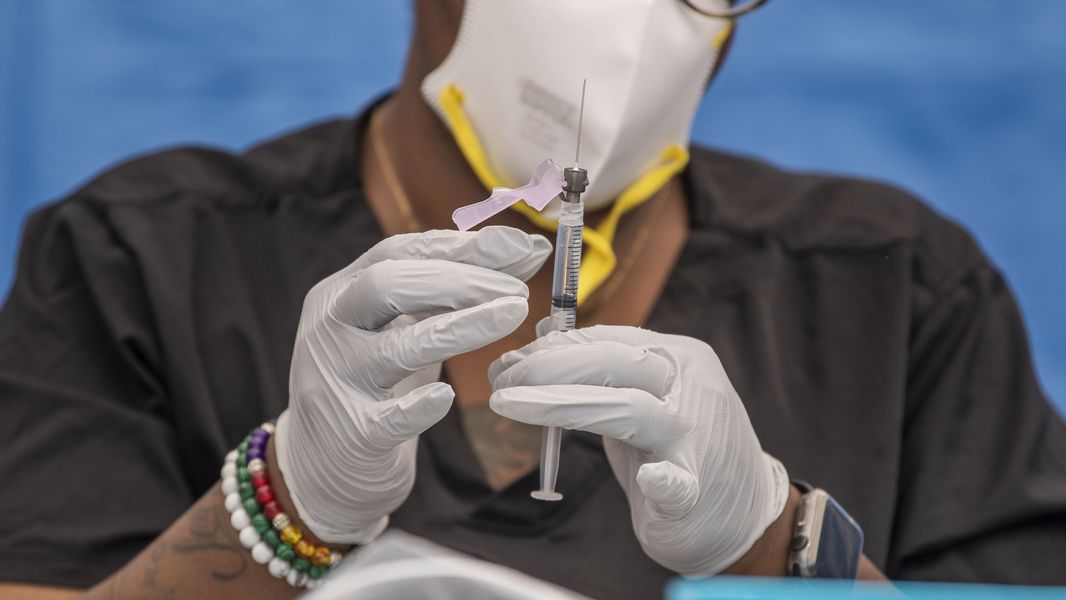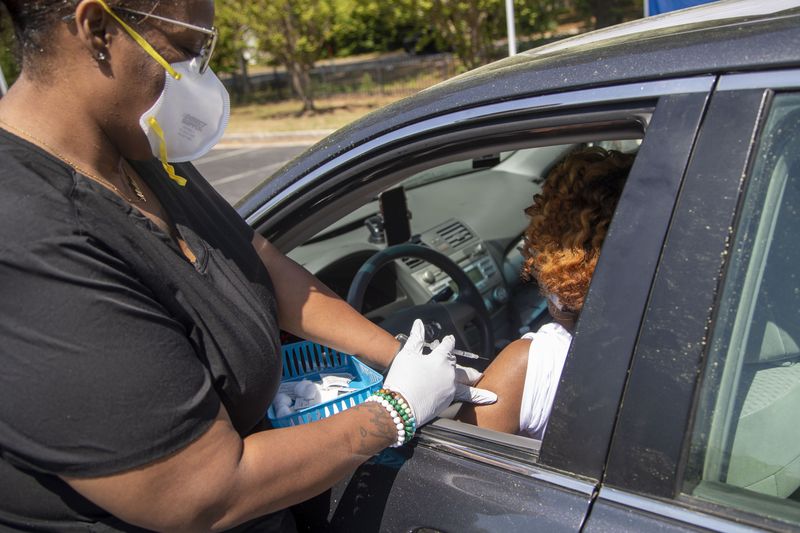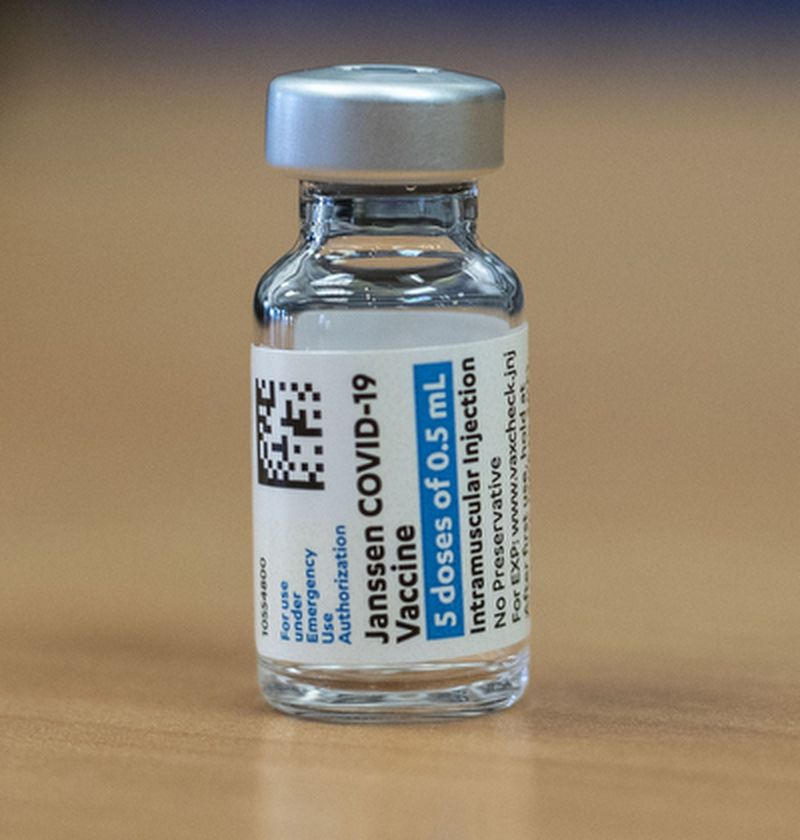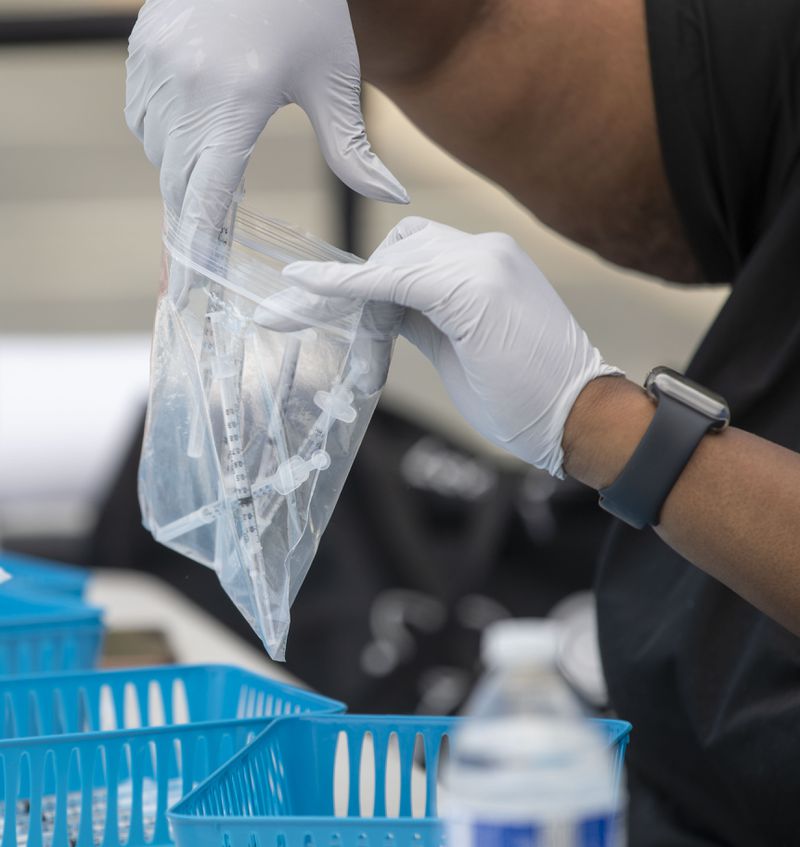
A medical worker prepares a Pfizer vaccination shot at an IRC and CORE drive-thru vaccination site located at the East Lake YMCA in Atlanta, Tuesday, April 13, 2021. The drive-thru site was also offering the Johnson & Johnson vaccine, but stopped Tuesday after the U.S. Food & Drug Administration and the Atlanta-based Centers for Disease Control and Prevention said Tuesday morning they are recommending a pause in using the one-dose COVID vaccine after six people suffered “rare” and “severe” blood clots after receiving vaccine. (Alyssa Pointer / [email protected])
By Helena Oliviero, Ariel Hart and Eric Stirgus
Tara Madar, a restaurant manager who lives in Atlanta, took the day off from work Tuesday to get the Johnson & Johnson single-dose vaccine. It didn’t work out that way.
Madar woke up Tuesday morning to the news that federal authorities called for an immediate pause of the use of Johnson & Johnson’s vaccine. The recommendation to halt the shots came after six women in the United States developed a rare disorder involving blood clots within about two weeks of vaccination. Georgia immediately followed the advice, suspending the use of Johnson & Johnson statewide.
Tadar had another decision to make. It wasn’t easy for her to decide to get vaccinated, but she was swayed by the lure of J&J’s one-and-done shot. Would she still get a COVID-19 vaccine? Or hold off at least a bit longer?
“To be honest, the thought crossed my mind,” said Tadar, though she ended up getting a dose of the Pfizer-BioNTech vaccine Tuesday.

A medical worker administers a Pfizer vaccination shot at an IRC and CORE drive-thru vaccination site located at the East Lake YMCA in Atlanta Tuesday. The drive-thru site stopped offering the Johnson & Johnson vaccine Tuesday after federal agencies called for an immediate pause of the J&J vaccine. (Alyssa Pointer / [email protected])
The pause in the use of Johnson & Johnson’s vaccine shook Georgia’s efforts to inoculate as many as possible as virus variants proliferate, and it remained unclear Tuesday how much of a setback the development might pose. Federal officials insist there is now enough supply from the other authorized vaccine brands, Pfizer and Moderna, to more than meet the need.
But the Johnson and Johnson vaccine offered benefits the other two don’t: for one, a more traditional recipe that appeals to Georgians who are nervous about the new messenger RNA technology used to develop the other authorized shots. And crucially, J&J offers a huge logistical advantage for those attempting to vaccinate more transient or homebound populations— a single shot that can be given without scheduling, and transported easily without deep freeze storage.
Nearly 7 million people in the U.S. have received the J&J shots so far.
The move comes at a time when Georgia, after months of steady declines of new coronavirus cases, is seeing a slight uptick in cases. Georgia also faces steadfast vaccine hesitancy among significant numbers of people.
The Food and Drug Administration and the Centers for Disease Control and Prevention will now study whether the vaccine is linked to the disorder. Chief Medical Adviser to President Biden, Dr. Anthony Fauci, said Tuesday that he expected the review to take “days to weeks, rather than weeks to months.”
Appointments rescheduled
All six cases of the rare and severe blood clots occurred among women between the ages of 18 and 48. One woman died and another is in critical condition.
None of the six were Georgia residents, the Georgia Department of Public Health said.
Officials also said the cases are unrelated to reactions to the J&J vaccine reported last week at a site in Cumming. Eight people experienced reactions ranging from dizziness to nausea shortly after getting the shot, prompting DPH to suspend use of the vaccine there.
Federal health officials said Tuesday those reactions were common in adults being vaccinated with any vaccine and were no cause for concern.

An empty Johnson & Johnson COVID-19 vaccination vial at Concord Carlton’s Pharmacy in Dunwoody. (Alyssa Pointer / [email protected])
The Johnson & Johnson vaccine received emergency use authorization in late February, and Georgia received its first shipment in early March.
Subsequently, nearly 270 Georgia sites have been allocated doses. But the number of Johnson & Johnson doses has been limited in Georgia, with most people receiving the Pfizer or Moderna vaccines, which were authorized late last year.
The state was set to receive about 17,000 doses of the Johnson and Johnson vaccine this week, according to figures from the CDC. But Georgia is set to receive 149,760 doses of Pfizer and 111,000 doses of Moderna this week, up about 18,600 from last week.
That increase will help offset the pause in the J&J doses, state officials said.
DPH said it is working with district health departments to provide Pfizer-BioNTech or Moderna vaccines for those with previously scheduled appointments for the J&J vaccine. In some cases, this may require rescheduling, DPH said.
The abrupt announcement did send some vaccine providers scrambling. A spokesman for DeKalb County’s Board of Health said it could not yet speak to whether the suspension would have an impact on the county’s vaccination efforts, or how much of one. “Hopefully, we’ll be able to answer that question better, once we have more information,” said the spokesman, Eric Nickens.
At Carlton’s Dunwoody Pharmacy in DeKalb County, workers said they’ll keep the 200 J&J doses they have refrigerated until they additional guidance from state health officials. Some people who wanted the one-shot J&J vaccine were disappointed but took the pharmacy up on its offer to get the two-shot Moderna vaccine instead, said Leslie Juhn, the pharmacist-in-charge.
“We want to make sure everyone gets vaccinated with something,” Juhn said.
Juhn said the pharmacy had used 100 doses of the J&J vaccine it received last week.

A medical worker places Pfizer vaccination shots in a bag for storage in a cooler at an IRC and CORE drive-thru vaccination site located at the East Lake YMCA in Atlanta Tuesday. (Alyssa Pointer / [email protected])
The issue with the J&J vaccine also was a cause for concern for nursing homes, said Tony Marshall, a lobbyist for the industry.
“We’re trying to work with DPH to develop a long-term plan,” he said. With the turnover facilities see in residents and staff, the ability to give shots without having to schedule follow-up shots, or schedule multiple people in a row in order to fit in the other vaccines’ thawing window, was key.
“Our plan includes the Pfizer and Moderna vaccines,” he said. “It’s just that Johnson & Johnson offered something that provided more flexibility.”
‘Abundance of caution’
About 300,000 to 600,000 people a year develop blood clots deep in a vein, according to the CDC.
The particular blood clotting disorder that vaccine recipients developed, known as cerebral venous sinus thrombosis, occurred along with a dangerous decrease in platelets, the plate-shaped parts of blood that make blood clot.
S. Mark Tompkins, a virologist and professor of infectious diseases at the University of Georgia’s Center for Vaccines and Immunology, said there are between 4 and 10 cases each year per million people. They are more likely to take place among women, he said, and be associated with pregnancy and oral contraceptive use.
He noted that in Europe, the AstraZeneca vaccine had similar rare clotting disorders reported. That vaccine and J&J’s both use a form of an adenovirus to prompt the immune response against COVID-19.
But scientists have said it isn’t clear if the vaccines cause the clots.
U.S. regulators describe J&J reports as a “safety signal” — a cluster of cases requiring further review.
“When they say signal and not association it’s because we don’t know that, but it’s enough of a signal they want to take a closer look,” Tompkins said. “This highlights how carefully we take people’s health in consideration with vaccines in general.”
Fauci, speaking at a White House briefing Tuesday afternoon, said the announcement was also designed to alert doctors to be on the look out.
“I think this is an unusual occurrence of a serious adverse event that you want to make sure before you go forward, you investigate it thoroughly. And that’s exactly what they’re doing, they’re pausing so that they can look at it more carefully,” Fauci said.
Brian Castrucci, an epidemiologist who had worked for the Georgia Department of Public Health and now heads a public health charity in Maryland, said the pause should give people confidence in the monitoring and the safety of the vaccine, since it came after just six cases out of nearly 7 million J&J doses.
“A hard decision was made to stop providing the vaccine and we have done this out of an abundance of caution, and this should give us tremendous confidence (about) the federal government’s willingness to prioritize the safety of Americans,” he said. “But we have to be realistic. For those who are advancing anti-vaccination messaging, this is a good day for them.”
Read the original story on AJC.com.











